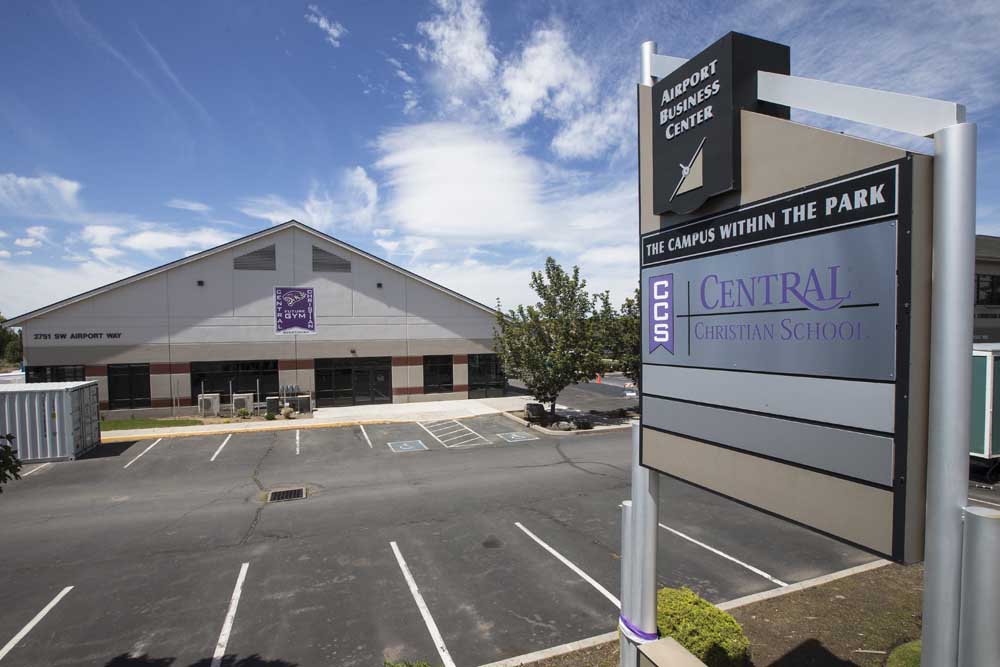Two local Christian schools ask state for exception to reopen classrooms
Published 10:15 am Monday, August 24, 2020

- The exterior of the new gymnasium at Central Christian School in Redmond on Wednesday, June 3, 2020.
Private Christian school students could be the only grade school-level children in Deschutes County to learn in classrooms this September — if the governor lets them.
In a letter sent Aug. 10, the heads of Central Christian School and Morning Star Christian School asked Gov. Kate Brown to reevaluate her reopening metrics for schools and allow private schools to meet more lenient state reopening rules from June.
The letter was also signed by administrators and teachers from 29 different Oregon private Christian schools and a handful of politicians, including state Sen. Tim Knopp, R-Bend.
These schools argue their small student populations will allow them to teach students safely inside classrooms, and their finances could suffer if students aren’t taught in-person.
“At this point, we’re going to exhaust every possibility (to reopen),” Elisa Carlson, head of school for Central Christian School, said.
Carlson couldn’t answer when asked what her school would do if the state rejects their request.
Although Central Christian is banking on a state exemption, Morning Star still plans to start school remotely, despite administrator Joe Bales signing the letter to Brown.
To reopen public or private schools, a county must have 10 or fewer COVID-19 cases per 100,000 residents and 5% or less positive tests per week, according to the governor’s mandate. The state must also have 5% or less positive tests as a whole. An early August update made it easier for schools in smaller-population counties to reopen, but the high standards remain for Deschutes County schools that aren’t remote.
Deschutes County’s positive test rate has been below 5% for the past three recorded weeks. But case counts, although dropping, are still above 30 as of Aug. 15, according to the Oregon Health Authority.
All three public school districts based in Deschutes County plan to start the school year remotely. Four prominent private schools in the Bend area — Seven Peaks School, Trinity Lutheran School, Cascades Academy and St. Francis of Assisi Catholic School — will also start remotely, unless local COVID-19 rates can improve by September. These four schools — two serving grades K-12, two serving grades K-8 — expect to have a combined fall enrollment of about 825 students.
Central Christian School, serving just over 200 K-12 students on Redmond’s east side, is taking a different route.
In a late July survey of the school’s parents, 90% said they wanted their children back in classrooms, Carlson said. She wants to honor those parents’ desire.
“One of our main missions is to serve our families, so you have to make sure to serve them the way they want,” Carlson said.
In June, when the state’s original school reopening guidelines had no COVID-19 metric requirements, Carlson promised families that Central Christian would reopen. The state’s standards didn’t shift until after she collected tuition — which ranges from $4,400 to $9,055 per year, she said.
Carlson is also frustrated that the state is forcing private schools to close, but not giving them funds for remote learning, she said.
“The mandates are coming from the state department (of education), but they’re not funding them as they are for our public counterparts,” she said.
Knopp, one of nine Republican state legislators to sign the letter to Brown asking to reopen private schools, said that forcing private schools to close without giving them state money could threaten the financial health of these schools.“The shutdown is going to lead to a lot of these schools being financially challenged, and potentially even going under, if the requirements last and apply to the private schools,” he said.
Both Knopp and Carlson argued that most private schools’ smaller enrollment allows them to more effectively space out students to prevent the spread of COVID-19, and will be more flexible if a negative situation arises, compared to larger public schools.
“It’s like a speedboat versus a large cruise ship — it’s not as hard to maneuver to make changes and shifts,” she said.
If Central Christian is allowed to open its classrooms, students will wear face masks and sit six feet apart, Carlson said. The school also replaced drinking fountains with water bottle filling stations to prevent COVID-19 spread, and will shift older students to a block schedule with fewer, longer classes per day, to reduce the amount of time roaming hallways, she said.
Bales, Morning Star administrator, refused to comment about the letter sent to Brown, which he signed. He said his school, which serves about 125 students in grades K-8, planned on starting classes remotely.
Maggie Hale, head of the K-12 High Desert Christian Academy in Prineville, was the only other Central Oregon school leader to sign the letter. However, Crook County’s COVID-19 case counts and positive test rates are low enough to welcome back students, according to Oregon Health Authority data.
When asked by The Bulletin whether the state would allow exceptions for private schools, Oregon Department of Education spokesperson Peter Rudy noted that many private schools already fall under more lenient rules for rural schools or those in small-population counties. These exceptions don’t apply to Morning Star or Central Christian, as they are too close to existing schools in Bend or Redmond.
“The re-opening guidance keeps our students, families and staff safe and helps Oregon move towards its highest priority, which is in-person instruction,” Rudy wrote in an email.





